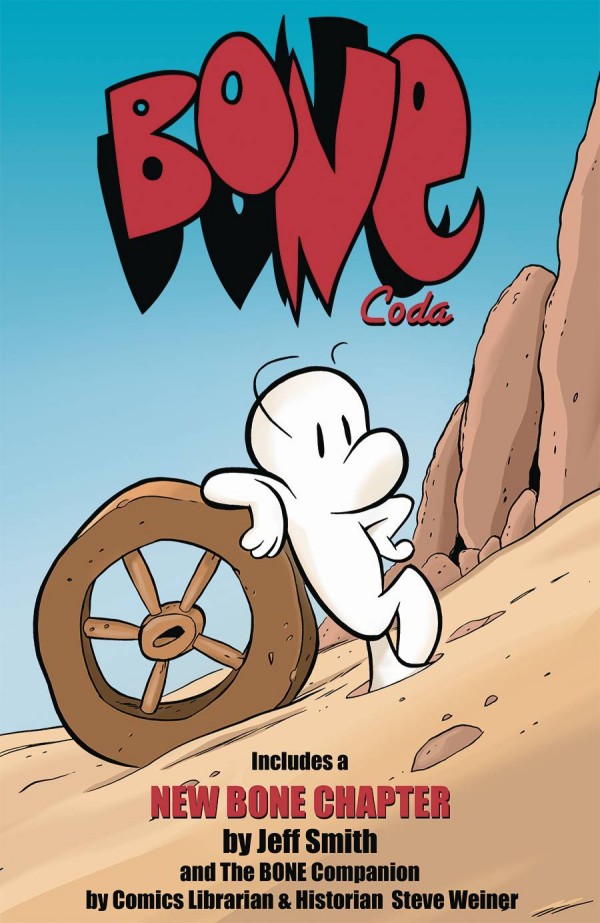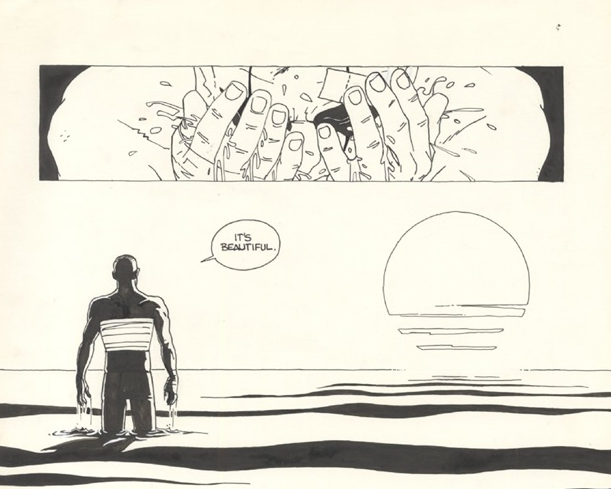 Written by Robert Venditti
Written by Robert VendittiIllustrated by Brett Weldele
Top Shelf
I wish I could say I was cool and read this before the movie was coming out, but I'd be lying. Oh, I had it on the shelf before the movie, thanks to my good friend Noah, but I did not get around to reading it until shortly after I picked up the prequel from Top Shelf at SPX.
When you think of Top Shelf as a publisher, you probably think of Jeffrey Brown, James Kochalka, and Craig Thompson, or maybe even Ignantz Winner Nate Powell or Alan Moore. What you don't think of, as a rule, are more traditional comic books.
Well, with the Surrogates, it's time to think again.
Vendetti and Weldele craft a tale that would fit right in with the world of Vertigo, Image, or Dark Horse in the home of diary comics and personal expositions as we learn of a future Georgia that's dominated by the scientific wonder that is the Surrogate.
At some point in the past of this future, a man named Lionel Canter created a way for people with disabilities to live their lives again by creating a doppleganger capable of living their lives for them. A great innovation that exploded (with corporate help) into a real-life virtual reality, where everyone over the age of 18 had the chance to be whoever they wanted and do whatever they wanted--all without leaving their doorstep.
Never age, never die, never leave your room--a sort of wet dream for World of Warcrafters everywhere, even if the Surrogates still had to go out into the world and work meanial jobs like their human counterparts had way back when. There's even talk of moving into juvenile models, saving parents the heartache of possibly losing their own child to accident or crime! What could be better?
That's the status quo which is rudely interrupted by a strange being who attacks Surrogates seemingly at random but may have a darker purpose in mind. Soon Detective Harvey Greer, a focal player at the start of the Surrogate wave back in the day, is caught up in a web of intrigue that involves complacency, coverups, cultists, and cops--and maybe a realization that the current state of affairs is not all it's cracked up to be.
Alliteration aside, Greer learns that to fight this criminal he might just need to do the unthinkable--return to his imperfect human body. Only be mingling with those who spurn the Surrogates (a dubious Prophet and his Reservation) and those who created them can Greer find out the truth. But will it be too late when the pieces fall into place. And does a now all-too-human Greer really want the culprit caught after all?
The Surrogates is a science fiction story mixed with a police procedural, and is compared by Top Shelf to a Philip K. Dick story. That's not too far off the mark, as there is a definite affinity to "Do Androids Dream of Electric Sheep" in the narrative. However, Vendetti works harder to build a comprehensive story and plays up the human elements a bit more than Dick's fiction as a rule, which seems far more interested in showing the lack of humanity in all of us.
It is much easier to relate to Greer and his conflicted opinion of the world than it is to emphathise with Deckard and his own conflicts because Vendetti is trying to show that Greer understands emotion and sees it slipping away while Deckard is probably too far gone as a person to live up to the task of sorting out what emotions are and who can have them.
As a result, following Greer's train of thought as he tries to get others to see why it might be worthwhile to be a human (while at the same time working hard to preserve the rights of others to remain surrogates) worked for me a bit better, though I enjoyed both stories and can see echos of Androids throughout Surrogates. Your milage on this may vary a bit, but when considering Vendetti's story, I think using Dick as a frame of reference is a good one and useful for drawing your own ideas about the merits of the story's ending.
I don't want to go too far into how the book ends because as with any good mystery to do so would spoil the contents, but I think it follows a logical progression of the actions of Greer, the Prophet, the Surrogates, and others. Whether or not those actions are correct or were the only way for things to play out is an entirely different matter. Part of what makes this such a good story is that Vendetti doesn't let the reader off that easily. Could certain consequences have been avoided? And what's more, should they have been? I know I was left asking those questions, and I'm sure you will be too, after reading.
As for the mystery itself, I think Vendetti does a pretty good job in a limited space (this was only a five-issue series) of giving the reader sufficient clues to figure out what's going on, including a few red herrings and actually allowing the reader to come to the solution if they've been paying attention. I always like it when the writer plays fair with the reader, and Vendetti does so here. The fact that I had it figured early on did not detract from my enjoyment at all--better that then madly flipping backwards trying to figure out how something happened, in my opinion.
I was also pretty impressed by Vendetti's ear for dialog. He's managed to find a way to blend science fiction jargon with the noirish feel of the dectective story and not have either sound like they come from a 1930s pulp story. (Or, alteratively, he did make it sound like it came from a 1930s pulp story, and that's why I liked it. Hard to tell with me, honestly, given my tastes.) The personal scenes with Greer and his wife especially have the ring of modern conflict of personal pain rather than a stereotypical argument to move the plot. This would have been a good story regardless, but Vendetti's script writing helps make it even better.
This is normally the place where I'd complain about Weldele's decision to digitize straight from his pencils, as I am a big fan of inking work first. However, I have to admit that I was less jarred by the technique than I have been in the past. Part of that might have been the nature of the story--a noirish narrative with sketchy artwork flows better than, say, the bombastic nature of a more traditional superhero story, or even a straight fantasy work. I also liked the inclusion of actual photographic images to help with the backgrounds. There were some places, though, where I felt the artwork was just a bit too flat for my taste.
As is the trend these days, Surrogates has a lot of non-comic pages within the trade, adding background information to the narrative without taking extra pages for exposition. I have to admit, I only tend to scan those pages, but the level of detail that Vendetti and Weldele went to on some of them--the ads for Surrgates are amazing!--is worthy of note. Those who take the time to read everything will be well-rewarded, I think. There's also some enjoyable goodies in the back, including all the covers, how a page went from script to art, and even a deleted scene that I think was a good choice for omission.
Top Shelf is getting some well-deserved attention due to the movie tie-in, and I hope those who go to see Bruce Willis will stop and pick up the comic Surrogates is based on. Those who like detective stories or science fiction will be well-rewarded, too. Don't let someone read this for you--you'll want to enjoy it for yourself!







